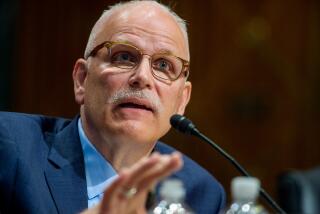The Agency Went, but His Job Stayed
- Share via
Even before taking his oath of office as a presidential appointee in 1994, California businessman Gus Owen knew his days were numbered. Or so he thought.
After all, the Orange County Republican businessman was being named to the Interstate Commerce Commission, just as Congress was preparing to shut it down. Sixteen months later, the commission is gone, but Owen is still in town.
He is now one of three former commissioners who transferred to the new Surface Transportation Board, a spinoff of the Interstate Commerce Commission. Same office, same building, same pay. And to a greater extent than he’d like, he’s enforcing the same regulations.
*
“I felt the [shutdown] agreed with my philosophy,” Owen said of the commission that had become the epitome of excessive government regulation. The commission enforced rules for the transportation industry, including railroads, trucking and barge lines.
“I only came to serve for a couple or three years, not a career.” Maybe less, he added, if the commission closed its doors sooner.
But to Owen, it became a job that wouldn’t die. And he says it is one of the lessons he has learned as a newcomer to Big Government: For all the talk of getting rid of the 108-year-old independent regulatory agency, the commission wouldn’t simply disappear in a cloud of pixie dust.
“The original premise was that with the ICC closing, everything would close down,” Owen said of the concept backed by Congress and the Clinton administration. “But industry and certain elements of Congress wanted some surviving entity to handle the rail functions that needed to continue.”
Opponents of the commission closure bill feared that such drastic deregulation would lead to higher rail rates and steep prices for consumers, and reduce protections for rail workers who lose their jobs in mergers or sales.
Ironically, Owen also concluded that “core” commission rail functions should be preserved, but for the opposite reason. He did not think deregulation had gone far enough.
Shutting down an agency for the sake of saying so was a “hollow victory” if the rules stayed on the books and enforcement had to be picked up by other departments, he argued.
So that’s why Owen is still in Washington. He wants to see deregulation reach the point where there is no need for the Surface Transportation Board, a quasi-independent arm of the Department of Transportation that employs 125 of the 628 workers that were in place when he joined the commission.
One of his top priorities is to get rid of government rules requiring the railroad industry to pay six years of wages and benefits to dismissed or displaced workers. That should be negotiated between the industry and the unions, he argues.
It’s not an obscure point, considering that Owen and his two fellow board members will have to act this summer on the proposed giant merger of Union Pacific Corp. and Southern Pacific Rail Corp. involving 54,000 workers and 35,000 miles of track across the United States. The merger could cost California almost 2,000 jobs.
To Owen, there are other lessons--including one he learned from General Services Administrator Roger W. Johnson, another Orange County Republican and friend who has resigned effective March 1. Owen said he believes Johnson so upset the status quo that he was unfairly placed under a microscope for his use of government telephones, staff and other resources.
Hoping to avoid a similar fate, Owen equipped his expansive commission office with a privately billed telephone, his own personal computer, fax machine and postage stamps, and decided to pay his business-related travel expenses. “I just wanted it completely clean,” he said.
Less “clean” was the manner of doing government business, he found. Owen was frustrated by Civil Service rules that protect workers used to performing inefficiently and was amazed by the one-week delay to get a Rolodex through the federal purchasing system when he could buy one at a lower price during his lunch hour at a store just four blocks away.
*
Meanwhile, Owen is also working with Congress to impose term limits for all federal commissioners--presidential appointees sitting on commissions that oversee federal regulatory agencies. These include such groups as the Federal Communications Commission, the Securities and Exchange Commission and the Federal Trade Commission. Term limits for his own board were written into the ICC-closure bill at his suggestion.
“My time limit is to go home tomorrow,” he jokes, adding that realistically he will definitely be back in California by the end of 1997 when his term expires. If all goes as planned.
More to Read
Get the L.A. Times Politics newsletter
Deeply reported insights into legislation, politics and policy from Sacramento, Washington and beyond. In your inbox twice per week.
You may occasionally receive promotional content from the Los Angeles Times.










